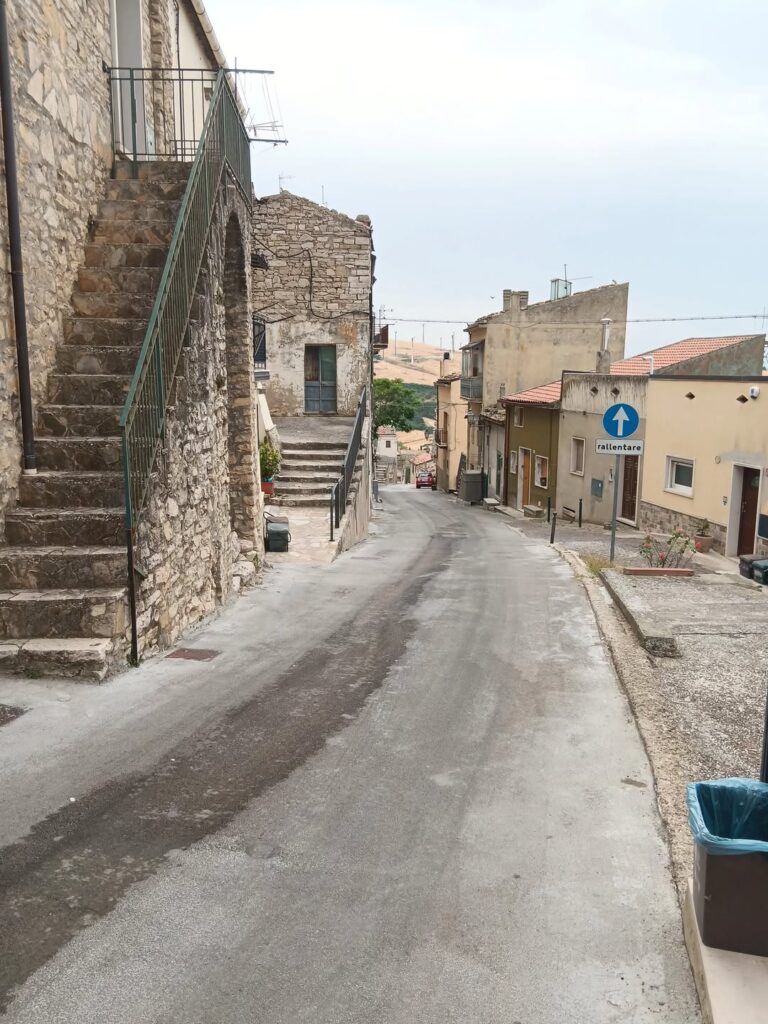
The Whispers of a Dying Dream in Italy’s Forgotten Corners
By Michael Lamonaca 11/10/2025
From Hollywood blockbusters like Roman Holiday to the sun-drenched romance of Under the Tuscan Sun, the world is fed a beautiful, intoxicating dream of Italy. It’s a land painted with the vibrant hues of passionate love, ancient cobblestone streets, overflowing plates of pasta, and the effortless charm of “la dolce vita”—the sweet life. This carefully crafted fantasy whispers of idyllic village life, of tight-knit communities, and a quality of existence that seems utterly unattainable anywhere else. For decades, this has been Italy’s most successful export: a cultural postcard promising warmth, beauty, and boundless joy.
But what if that postcard is just a carefully airbrushed lie? What if the “sweet life” is, for many of its own people, an “amara realtà”—a bitter truth that rarely makes it past the tourist brochures?
I grew up in Forenza, a village in Basilicata, an ancient corner of Italy far removed from the bustling tourist trails. Here, the true rhythm of Italian life beat a different, quieter drum. Forty years ago, as a young man, I made a heartbreaking choice. I left. I didn’t leave for adventure or fleeting opportunity, but out of sheer desperation, fleeing a system suffocated by pervasive corruption and an economy that offered little more than stagnant hope. The illusion of a better future elsewhere pulled me away, first to London then to Sydney, where I finally found the freedom to live without compromising for injustice. Still, the ache of that initial departure, born from a deep-seated disillusionment with my homeland, has never truly faded; the dream of a just and prosperous Italy had long been shattered by the harsh reality I witnessed back then.
The Italy often seen on screens and celebrated by visitors doesn’t reveal the relentless grind for decent work, where opportunities are scarce, particularly for the youth, forcing a continuous, heartbreaking exodus. It doesn’t show the alarming surge in drug consumption, including heroin, cocaine, and alcohol—a silent epidemic that corrodes the edges of communities, with both young and old desperately trying to numb themselves to escape a seemingly hopeless reality. And it certainly doesn’t pull back the curtain on the insidious corruption that, like a persistent shadow, infiltrates every corner of daily life, undermining trust and strangling progress. This is the unvarnished truth for countless Italians – a harsh reality far removed from the carefree ideal the world so readily consumes.
Now, after four decades away, I’ve returned to Forenza for a few months, seeking a fragile peace within the familiar walls of my parents’ house, those same walls that once echoed with family laughter but now hold only their memories, as both have passed away. I harbored a quiet hope for nostalgia, for the gentle embrace of a past untouched. But what I found was not a quaint village waiting to embrace its returning son, but a community profoundly changed, worse than the one I left. The vibrant life I once knew has withered, replaced by an unsettling isolation. The once-bustling piazzas are often deserted, shops shuttered, and a palpable sense of abandonment hangs heavy in the air. The youth have fled, leaving behind a skeletal framework of what was once a thriving, connected place. The “sweet life” has curdled into a desolate silence, a mournful whisper.
And then there’s the noise. A pervasive, relentless hum that pierces the quiet of the Basilicata countryside, emanating from the towering wind turbines that now scar the landscape, turning idyllic vistas into industrial zones. It is here, right inside the home where I once found solace, that the “Dolce Vita” illusion completely shatters. At night, the drone intensifies, amplified to an unbearable level, a low, rhythmic thumping punctuated by a relentless whoosh, vibrating through the very walls. It steals sleep, shatters concentration, and gnaws at any sense of tranquility. This is more than just environmental pollution; it’s a constant, grating reminder of a “progress” that came at the devastating cost of peace, health, and dignity for ordinary people like my family and neighbors. This constant mechanical roar is an assault on the senses, a symbol of promises broken, mirroring the societal decay I once fled, only now, it’s inescapable and amplified right outside my childhood window.
I have tried to raise my voice, desperately reaching out to local mayors, national government ministries, and even the European Union. I have presented my case to national and international media outlets, hoping someone, somewhere, would listen to the suffering. Yet, my greatest despair comes from the silence not just from those in power, but from those who suffer alongside me. This indifference and impotence to confront power, their fear of fighting, and their own intrinsic personal connections, combined with a deep-seated resignation that nothing will ever change, is precisely why corruption thrives and degradation deepens. It’s a self-perpetuating cycle: the lack of collective will to fight allows the rot to spread, transforming a nation’s potential into perpetual decline, and it is precisely why their children are forced to immigrate in search of a little dignity. This chilling reality, played out in villages like Forenza across Italy, perfectly encapsulates the “bitter truth” behind the postcard.
This isn’t “La Dolce Vita.” This is the unheard story of a beautiful land, marred by the deafening personal interests of its politicians, the silence of its people and their unwillingness to fight for justice, and an unbearable noise for its residents, trapped in a cycle of despair. It’s the stark truth behind the postcard, a testament to a life that is anything but sweet.